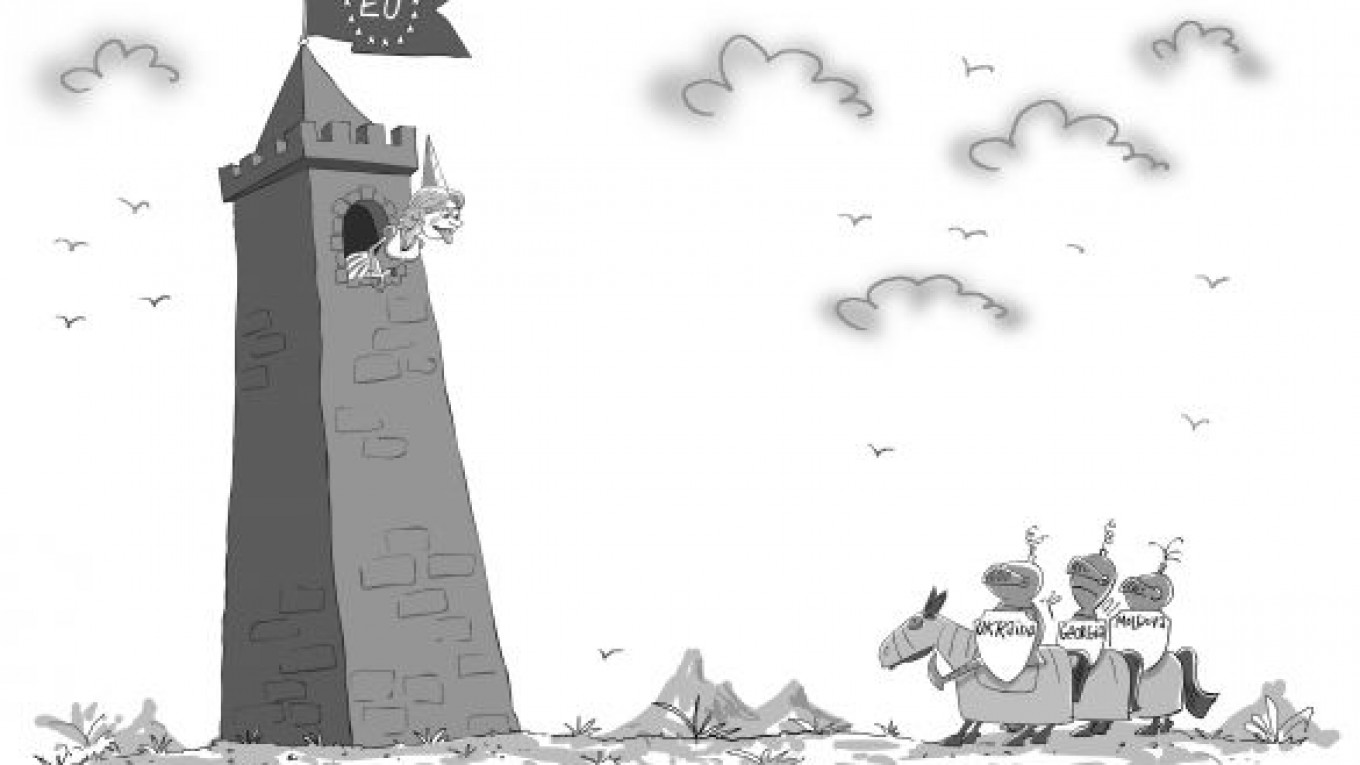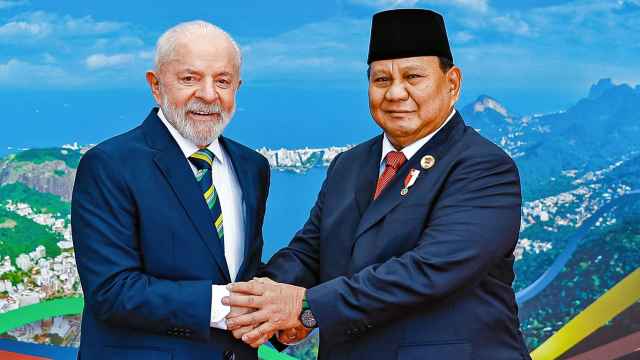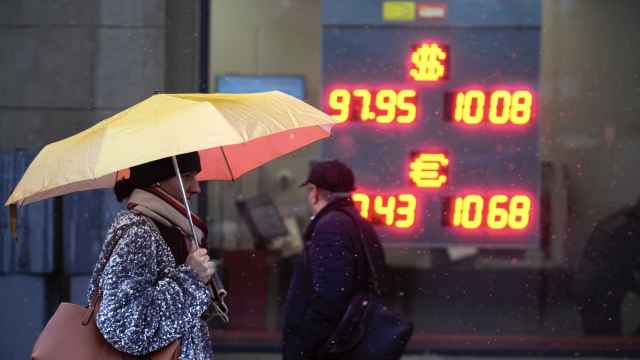Success stories in what the European Union calls “the neighborhood” have been hard to come by. First Georgia, then Ukraine and most recently Moldova have all been big EU hopes. But in each case, those hopes were dashed.
The EU is reviewing its European Neighborhood Policy, launched in 2004, and the Eastern Partnership, launched in 2009, ahead of a second grand summit in Budapest under the Hungarian EU presidency in May. But France has dragged its feet on easing visa requirements for Ukrainians, and EU negotiators are frustrated with the total lack of progress toward a Deep Free Trade Agreement, which they blame, rightly, on the Ukrainian “oligarchs” who have returned to power since Viktor Yanukovych became president in February.
One problem has long been the lack of enthusiasm on the EU side for further expansion into the region. More recently, the EU has also had to face the reality of competing with Russia in what President Dmitry Medvedev calls Russia’s “sphere of privileged interests.” Increasingly, however, the problem is with Eastern Europe’s states themselves.
First, these are new states whose sovereignty was often contested at their birth in 1991, and they have remained weak. Their independence was a result of the Soviet collapse, and while some had national revolutions, in most cases Soviet elites and political culture remained entrenched. Corruption is rife, state capture by powerful vested interests is the norm, and institutional effectiveness and capacity for reform are weak.
Second, they have the economies of weak states. With the crucial exception of energy-rich Azerbaijan, they have few natural resources or high-value manufactures and have large agricultural sectors. They also depend on economic rents or Russian derivatives rather than adding value themselves. For example, Ukraine makes profits from gas transit and Belarus from oil refining.
Many sell raw materials or base products — Ukrainian steel, for example — where export competitiveness depends less on product quality than on global commodity prices. The two economies in the region that appear most successful — Belarus and Azerbaijan — are the furthest from the EU model. Their good fortune is not due to their domestic policies, but to hydrocarbons in Azerbaijan’s case and, in Belarus, to Russian subsidies.
The emulation effect that spurred Central European reform in the 1990s is not working farther east. Unlike the EU accession candidates of the 1990s, the states of Eastern Europe and the Caucasus have little incentive or capacity to adopt the Union’s body of law and move up the value chain.
Third, although they would no doubt protest loudly at such a description, states like Ukraine are better thought of as balancers rather than joiners. Playing a game of balance between Russia and the West allows the elite to remain in power and to preserve the oligarchical economy in an otherwise harmful equilibrium of semi-reform.
Indeed, local leaders are modern-day Titos, unable or unwilling to join either Europe or Russia. But both Russia and the West are sufficiently interested that they feed the game of balance with enough resources to enable local leaders to fend off rivals and excuse their own lack of reform.
Some are reluctant balancers. Moldova’s current government, the Alliance for European Integration, might be a lot more pro-European if it had not seen how Russia treated supposedly pro-Western governments in Georgia and Ukraine before it. Some play the game with relish. Ironically, Belarussian President Alexander Lukashenko is suddenly something of a regional role model in this regard.
The EU can continue to muddle along with its one-size-fits-all policy of “enlargement-lite” in the region. Or it can work harder to turn balancers into joiners.
There are genuine prospects for changing the incentive structure in small states like Moldova, particularly if the EU can help build up long-term institutional capacities. But, elsewhere in the region, the union should recognize the reality of each individual game of balance and work within the limits of what is possible in order to promote EU interests.
First, the EU should work to Finlandize Ukraine, whose foreign policy, like Tito’s, is now officially “nonaligned.” NATO expansion is off the table. Yanukovych has leaned toward Russia in the short term but has already reached the point that he needs other powers to balance Russia. The EU can accept Ukraine’s foreign policy constraints, while concentrating on helping it transform its economic and social structures and preserving its democracy.
A second strategy is to “Serbianize” Georgia. Like Serbia and Kosovo, Georgia should be encouraged, if not to forget about its rebel provinces, then to abandon the kind of manifest-destiny politics that subordinates everything to the recovery of sacred lands, leaving the country free to concentrate on internal reform.
Finally, the EU should work to “Francoize” Belarus. A political opening is unlikely, but the Belarussian economic model cannot survive, with the trade deficit forecast to exceed $7 billion (14 percent of gross domestic product) this year. Belarus cannot borrow enough to cover this. As with Spain under Franco, Belarus’ economy will change before Lukashenko does, laying the basis for rapid development once he is gone.
Andrew Wilson is a senior policy fellow at the European Council on Foreign Relations, a pan-European think tank. © Project Syndicate
A Message from The Moscow Times:
Dear readers,
We are facing unprecedented challenges. Russia's Prosecutor General's Office has designated The Moscow Times as an "undesirable" organization, criminalizing our work and putting our staff at risk of prosecution. This follows our earlier unjust labeling as a "foreign agent."
These actions are direct attempts to silence independent journalism in Russia. The authorities claim our work "discredits the decisions of the Russian leadership." We see things differently: we strive to provide accurate, unbiased reporting on Russia.
We, the journalists of The Moscow Times, refuse to be silenced. But to continue our work, we need your help.
Your support, no matter how small, makes a world of difference. If you can, please support us monthly starting from just $2. It's quick to set up, and every contribution makes a significant impact.
By supporting The Moscow Times, you're defending open, independent journalism in the face of repression. Thank you for standing with us.
Remind me later.






